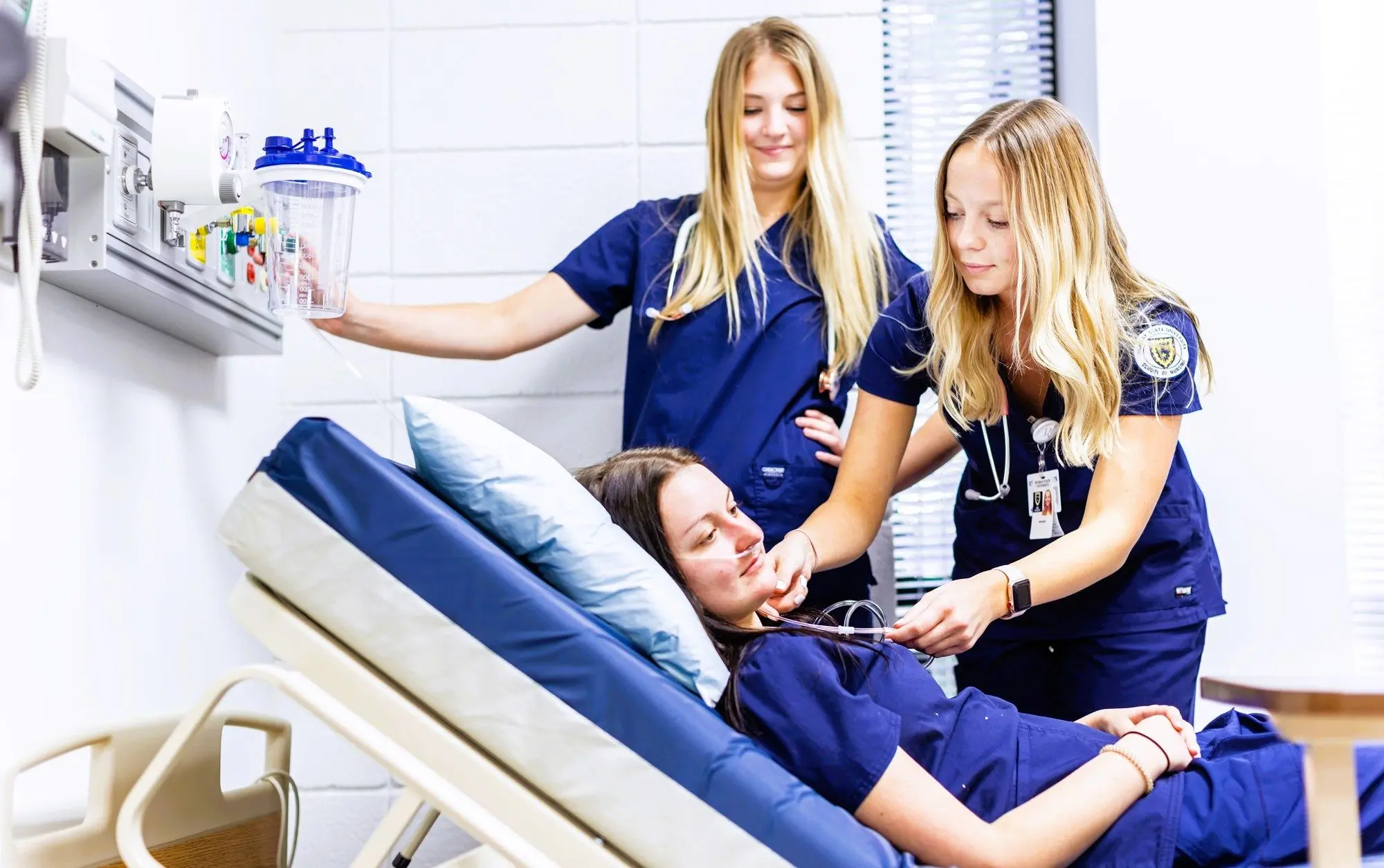
MURRAY, Ky. – The Murray State University School of Nursing and Health Professions (SONHP) recently received a $499,000 third-year continuation award as part of an ongoing grant that is part of the Nurse Education, Practice, Quality and Retention Simulation Education Training (NEPQR-SET) program, which is provided by the Health Resources and Services Administration (HRSA).
The most recent award was the third and final year of the grant, said Dean of the Murray State School of Nursing and Health Professions Dr. Dina Byers. In total, the SONHP has been awarded $1.5 million to carry out this project. The proposal was written by Drs. Dina Byers, Dana Todd, Tonia Mailow, and Jennifer Rogers, in partnership with Baptist Health Paducah.
The purpose of the NEPQR-SET program is to enhance nurse education and strengthen the nursing workforce by increasing training opportunities for nursing students through the use of simulation-based technology, including equipment, to increase their readiness to practice upon graduation. This training expands the capacity of nurses to advance the health of patients, families and communities in rural or medically underserved areas experiencing diseases and conditions such as stroke, heart disease, behavioral health, maternal mortality, HIV/AIDS and obesity.
Mailow, Bachelor of Science in Nursing (BSN) program chair and professor of nursing at Murray State, said students have responded positively to the simulation-based technology.
“By allowing students to practice in a risk-free environment, they have increased confidence when they go to the clinical area to take care of patients,” said Mailow. “It also allows students the opportunity to hone their critical thinking skills. Simulation requires real-time problem solving, which in turn improves clinical judgment and prioritization skills. We also do interdisciplinary/team-based simulations, which help students to improve communication skills and collaboration among a variety of medical disciplines.”
Mailow said that by integrating simulation into each nursing course, the SONHP has seen notable improvement in student growth in professional readiness and measurable outcomes.
“Students leave nursing school and enter the workforce with higher competency levels in essential clinical skills,” said Mailow. “Simulation technology has increased clinical readiness. Students may require less orientation and show better preparedness for ‘real world’ nursing. Using high-pressure scenarios allows students the opportunity to become more decisive, motivated to learn, and persistent in healthcare training programs.”
Mailow reiterated the importance of the simulation technology that the grant has afforded Murray State’s SONHP and looked forward to the future of Jackson Hall’s opening in the fall of 2026.
“Overall, simulation technology is a positive for Murray State Nursing, and we are very excited about our modern simulation lab that will be housed in the new nursing building, Jackson Hall,” said Mailow. “There will be more simulation suites, which will allow us to perform more hands-on simulations with more students. We are grateful for our new building and look forward to a bright future for Murray State School of Nursing and Health Professions.”
The goal of the NEPQR-SET program is to increase the number and capacity of nursing students to address the health care needs and improve patient outcomes of rural and/or medically underserved populations. An additional goal is to implement or expand academic-clinical partnerships to create experiential learning opportunities that prepare nursing students to efficiently address health equity for rural and underserved populations.
Through this grant, an academic clinical partnership was created with Baptist Health Paducah. Byers said this partnership has provided Murray State’s nursing students with a positive clinical experience.
“The BSN students are partnered with Registered Nurses (RNs) who serve as clinical instructors,” said Byers. “Many of the student participants have taken jobs at Baptist Health Paducah as a result of this project and their clinical experiences there. This project has improved students’ readiness for practice by expanding experiential and simulation training.”
Rogers said the HRSA grant has provided an opportunity to collaborate with Baptist Health Paducah in order to better prepare our student nurses for practice following graduation.
“Nursing students enrolled in Adult Health II have had the opportunity to work directly with nurse instructors, rather than faculty, to complete required clinical hours for this course,” said Rogers. “The students complete 12 hour shifts, using this opportunity to directly care for clients with their nurse throughout the day. The most rewarding aspect of the grant has been the relationships we have built with Baptist Health Paducah. We are very grateful for the support of Dr. Marilyn Riley and her staff at Baptist Health Paducah. Student feedback regarding this clinical rotation has been excellent. This has been demonstrated in the number of students seeking employment at Baptist Health following graduation.”
Vice President and Chief Nursing Officer of Baptist Health Paducah Dr. Marilyn Riley said this grant has helped to strengthen the hospital’s partnership with Murray State.
“We have always had a great relationship, and provide clinical rotations for students,” Riley said. “But with this grant, we have been able to have additional students, and this has allowed Murray State’s nursing program to increase enrollment, due to additional clinical capacity. The nurses at Baptist Health are the preceptors (adjunct faculty), whereby the nurses have two to three students per shift, for the entire shift. This is a development opportunity for the staff nurses, as they are paid for their normal shift and then receive a stipend through the grant.”
Additionally, the students have a more realistic experience of a nurse’s shift, being with the nurse from beginning to handoff at the end of the shift, Riley added.
“We have always hired Murray State grads, and the students are very prepared for their first RN role,” said Riley. “With the grant, we have been able to hire more students. Since they have their clinical rotation and love the hospital and the staff, they want to come and work here after graduation! Typically, we hire on average four students per semester but in May 2025, we hired 11 graduates! This grant program has been a win-win for both Murray State and Baptist Health.”
Photo: The Murray State University School of Nursing and Health Professions (SONHP) recently received a $499,000 third-year continuation award as part of an ongoing grant that is part of the Nurse Education, Practice, Quality and Retention Simulation Education Training (NEPQR-SET) program, which is provided by the Health Resources and Services Administration (HRSA). Through this grant, an academic clinical partnership was created with Baptist Health Paducah. Students are able to gain a more realistic experience of a nurse’s shift, being with the nurse from beginning to end of a shift.




